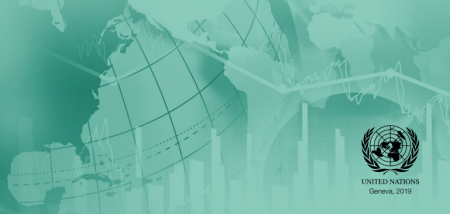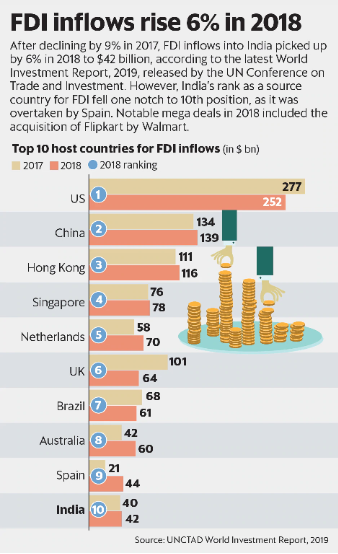World Investment Report 2019 14/06/2019 – Posted in: Daily News – Tags: UN Conference on Trade and Development
WORLD INVESTMENT REPORT 2019
For: Mains
Topic cover: Investment Report 2019, India’s performance with Global economies, UNCTAD
News Flash
UN report ranked India among the top 20 host economies for FDI inflows in 2017-18.
Foreign Direct Investment (FDI) to India grew by 6 percent to USD 42 billion in 2018, with strong inflows in the manufacturing, communication, and financial services sectors, and cross-border merger and acquisition activities.
Many countries adopted policy measures to promote and facilitate investment with India amending the model concession agreement on public-private partnerships in the port sector, UNCTAD said, adding the country liberalized rules on inward investment in several industries, including single-brand retail trading, airlines and power exchanges.
World Investment Report 2019 findings
- The World Investment Report 2019 is released by the UN Conference on Trade and Development (UNCTAD).
- India attracted over 77% of the total foreign direct investments that came to the South Asian region.
- In India, the growth in cross-border mergers and acquisitions (M&As) grew to $33 billion in 2018 from $23 billion a year ago, primarily due to transactions in retail trade ($16 billion), which includes e-commerce and telecommunication ($13 billion).
- The acquisition of India’s biggest e-commerce platform Flipkart by Walmart was a notable mega-deal, along with the telecommunications deals by Vodafone of the UK and American Tower (US) amounting to USD 2 billion.
- Among others in the South Asian region, FDI flows to Bangladesh and Sri Lanka rose to a record level, to $3.6 billion and USD 1.6 billion, respectively, while Pakistan witnessed a 27% decline in investment to USD 2.4 billion.
- FDI inflows in developing countries in Asia registered a rise of 3.9% to $512 billion during the last year.
- The report also highlighted that of the 5,400 special economic zones (SEZs) in the world, more than 4,000 are in developing countries in Asia.
- In the developing countries in Asia, China topped the list at 2,543 such zones, followed by Philippines (528), India (373) Turkey (102), Thailand (74) Korea (47), Malaysia (45) among others.
- South East Asian countries together host more than 700. South Asia hosts upward of 450 zones and West Asia’s tally surpasses 200.
- China’s continued policy experiment in large-area zones, investment facilitation measures and relaxation of foreign ownership in sectors such as finance and healthcare in pilot free trade zones are expected to draw future investments.
- India, the Republic of Korea, the Philippines, and Turkey are focusing on information and technology zones, while West Asia favors services and most of South-East Asia seeks to attract different types of manufacturing.
- Development of new SEZs also drives greenfield investment activities, particularly in the construction of industrial establishments and power generation such as the construction of zones in Indonesia, Thailand and Viet Nam.
- The number of SEZs in South Asia is set to increase substantially in the coming years. India has over 200 new zones in the pipeline.
- In Bangladesh, a further 60 SEZs are in the approval process. Pakistan is planning another 39 SEZs, in addition to its existing seven. Nepal, which has two zones, one of which is under construction, has plans to create 12 more.
UN Conference on Trade and Development (UNCTAD)
- UNCTAD is a permanent intergovernmental body established by the United Nations General Assembly in 1964.
- Its headquarters is located in Geneva, Switzerland.
- UNCTAD is part of the UN Secretariat and reports to the UN General Assembly and the Economic and Social Council.
- UNCTAD is also part of the United Nations Development Group.
- UNCTAD is dealing with trade, investment, and development issues.
- The organization’s goals are to: “maximize the trade, investment, and development opportunities of developing countries and assist them in their efforts to integrate into the world economy on an equitable basis”.
- The primary objective of UNCTAD is to formulate policies relating to all aspects of development including trade, aid, transport, finance, and technology.
- The conference ordinarily meets once in four years; the permanent secretariat is in Geneva.
Source: Livemint
You can follow us on LinkedIn and for more updates related to UPSC IAS Preparation, Like our Facebook Page and subscribe our Diligent IAS Youtube Channel
Also Read Related Daily News
- Economic capital framework for RBI
- Employees’ State Insurance Corporation (ESIC)
- Drought’s Alarming Situation


